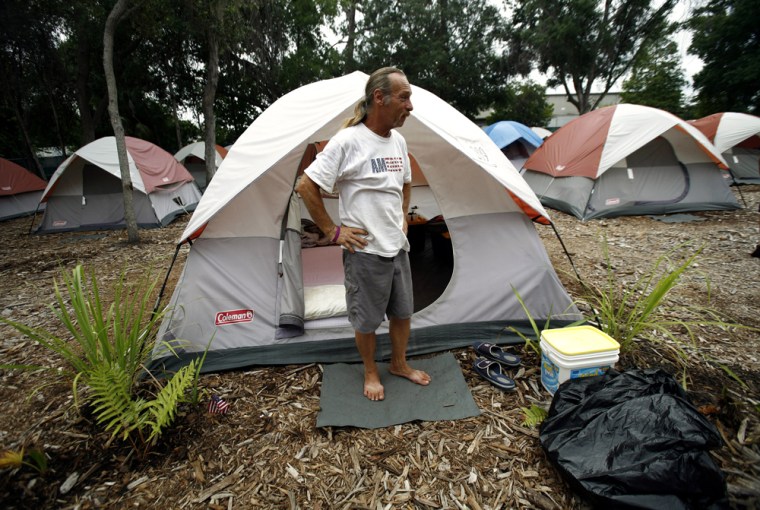A Florida tent city for hundreds of homeless people lies at the end of a dead-end street, but residents say they have not given up hope of a better life despite the U.S. economic downturn.
The Pinellas Hope camp, 250 single-person tents in neat rows on land owned by the Catholic Diocese of St. Petersburg in a wooded area north of the city, has been filled to capacity since it opened two years ago.
"I could open the gates and have over 500 people," said Sheila Lopez, the chief operating officer for Catholic Charities at the St. Petersburg diocese.
The camp has a food hall, bathrooms and showers, a laundry room and a few computers for residents to look for jobs and prepare resumes.
"This is a great place to be. It gives us a great opportunity," said Alex, a resident who declined to give his last name. "We have a safe place to live. It sure beats sleeping on the street."
The number of homeless people in the United States, one of the wealthiest countries in the world, is difficult to pin down, advocacy groups say, because most people are homeless for only a short period of time.
The National Alliance to End Homelessness estimates about 675,000 people are homeless on any given night during a one-month period. Between 2.5 million and 3.5 million Americans experience homelessness for at least one night in a year.
The alliance said it expects more than 1 million people to become homeless as a result of the current recession.
'The challenges remain significant'
Tent cities have sprouted across the United States and advocates believe they could represent the leading edge of a wave of homelessness in the coming months as U.S. unemployment, nearing 10 percent, rises.
"I don't think we've begun to see the end of it. I think the challenges remain significant and they remain in front of us," said Ron Book, chairman of the Miami-Dade County Homeless Trust, where calls to a homeless hotline have quadrupled in the last year.
Florida, where unemployment has soared as the recession put out of work thousands of people employed on construction sites during the housing boom, has nearly 50,000 homeless, according to the alliance. Nearly 6,500 of those are in the Tampa area.
Asked about the proliferation of tent cities at a news conference in March, U.S. President Barack Obama said it was "not acceptable for children and families to be without a roof over their heads in a country as wealthy as ours."
He cited his jobs programs and spending on infrastructure as ways of combating the problem.
In some places, tent cities are discouraged. In Seattle, for example, authorities arrested and moved homeless people from a tent encampment — called Nickelsville as a protest of Mayor Greg Nickels' policies — on city land last fall. Some of those people have recently returned.
In Sacramento, California's capital, authorities dismantled an illegal encampment of more than 100 people and moved the residents into shelters or permanent housing.
Pinellas Hope was welcomed by St. Petersburg. Mayor Rick Baker said the city contributed $250,000 to the camp last year and city crews helped clear the land.
"We're very supportive of Pinellas Hope. Catholic Charities is particularly good at running this," he said.
No drugs, alcohol or violence
The camp's residents range in age from 18 to mid-70s. No families are allowed.
Camp rules include no drugs, no alcohol and no violence. Residents come and go during the day but there is a 10:30 p.m. curfew during the week and midnight on Fridays and Saturdays.
Other rules tell residents to be courteous and respectful and to pick up after themselves.
Bob Kinzie, 58, said he has lived at the tent city for six months after losing his job with a security company.
Clean-shaven and neatly dressed in a T-shirt and pants, he said he was renting a home before he lost his job and his car and ended up at the camp.
"It's what you make of it. It's livable," Kinzie said. "I'll come out of this."
People are referred to the tent city by teams of local police and social workers. Once they are accepted, residents are assigned to case workers to try to help them get jobs.
Lopez said the average stay is about 77 days but many stay longer.
Scott, who also declined to give his last name, said he lost his job building boats because of the recession and had been at Pinellas Hope for two months.
"You can't complain. The people are really wonderful," he said.
Donations
Scott said he had applied for a job retraining program that was part of Obama's economic stimulus plan, but after being told he qualified, he got a message saying no new applicants were being accepted.
Lopez said it costs $2.6 million a year to run the camp with about half coming from donations of food and other items.
Pinellas Hope replaced a tent city in downtown St. Petersburg that was closed two years ago. Police forced residents to leave and slashed some tents.
Lopez said 80 one-person wooden huts were being added to the tents. She said the diocese hoped to build apartments on the land, which is far from any residential neighborhoods.
A copy of the Ten Commandments is posted prominently, along with signs calling for peace, joy, love and kindness.
"Hopefully, we can save some souls," Lopez said.
